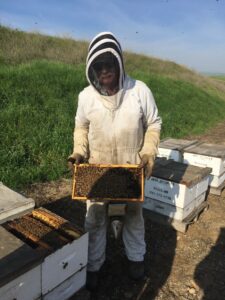BeeKeepers, The Gate Keepers of the Food Supply
Services we offer to the Beekeeper:
- Provide a written contract
- Find a suitable orchard for your bees. Placement by pallets, boom, or by hand
- Supply a computer generated map. Insure easy location of orchards & placement of hives
- Correlate arrival and departure of hives from orchard
- Negotiate fair price for rental of your hives with almond grower
- Act as a liaison between beekeeper and almond grower
- Have access to extra hives for emergencies
Best Management Practices for Honey Bee Pollination

Honey Bee Nutrition
- Healthy Bees need natural, diverse forage.
- Provide a supplemental feed in the fall.
Pest and Disease Control
- Monitor hives on a regular basis.
- Practice preventative maintenance.
- Follow label instructions.
- Do not over medicate or treat
Hive and Colony Management
- Mark hives & all equipment with DL#, CHP ID #, name, phone, city & state
- Keep equipment clean and maintained.
- Replace frames and comb when necessary
- Requeen colonies annually
- Provide access to clean, fresh water
Business Management
- Use a contract.
- Determine your pollination fee
- Be dependable and visible to your growers
- Have a contingency plan for the unexpected
- Keep good records to improve practices
- Continue your education: join organizations, attend conferences, access the internet and subscribe to bee journals.
- Mentor young bee keepers
Pesticide-related Bee Kill Reporting
Nosema Ceranae
According to www.projectapism.org, evidence suggests that the presence of Nosema is contributing to honey bee health problems. Scientists agree that Nosema ceranae is the most prevalent and economically damaging of the honey bee diseases. In serious cases, the colony may eventually die. It is important to examine and monitor your hives.
